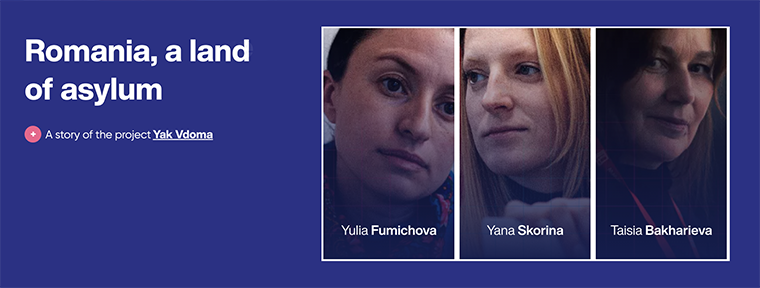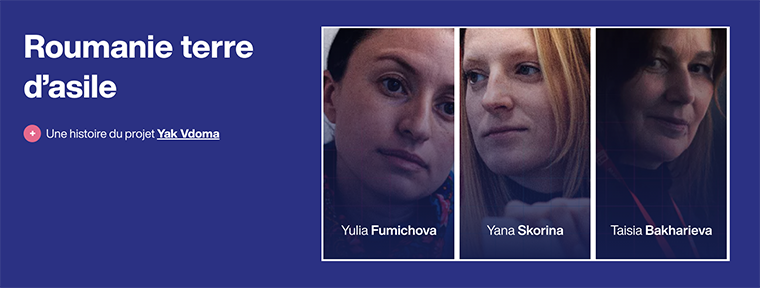Ksenia Kalieberda: shellfire overhead and Kherson on her mind
Since the Russian invasion, Ksenia Kalieberda recounts the lives of the people of Kherson, and in particular those of her friends and family. It is also the story of her own painful exile.
Ksenia sits patiently waiting. Aged 61, she is the oldest member of the Yak Vdoma residence. In her hands she holds her colleague Konstiantyn's latest book about a Ukrainian operetta singer. An hour later, at the height of her meticulous descriptions of how Kherson is faring, art resurfaces like a distant memory of life before: "I feel bad about our museum's truly unique collection. They took everything, it was worth more than 1 million dollars," laments Ksenia, as she reflects on the war treasure that Putin's army seized before its retreat.
But some good came of it too: "They also took the statues of Potemkin, Ushakov and Suvorov. They were right to take them, they're theirs," the woman says, consoling herself.
However, still within rifle range on the other side of the Dnieper, the enemy has not finished with Kherson, which they continue to pound. For Ksenia, the Russians are taking revenge for not having been able to hold on to the town: "From now on, they just want to destroy it, including the inhabitants." The proof is in the white phosphorus bombs (incendiary munitions that are theoretically banned against civilians) that are being dropped.
Ksenia tells it all with disarming simplicity and kindness. Only her voice, at times breathless, reveals the immense tension of the last ten months. Arriving in Bucharest at the end of September for a six-month period, she remains in constant contact with Kherson, the source of her a book whose title instantly reveals its tragedy: "Kherson under occupation in the 21st century."
A cultural journalist turned war reporter by force of circumstance
Originally an arts and culture specialist, Ksenia has become her home city's war chronicler. The online newspaper for which she wrote ceased publication on 5 March, when the Russians arrived. At first, Ksenia did what everyone else was doing and helped the people around her (baking bread which was no longer available in the shops), but then her nature took over. She began to describe the occupation.
"I recorded everything the Russians did in the city, the difficulties people had in making a living, the rising prices. Reality began to take on an incredible dramatic power, rather like the plays I used to write about," explains the journalist, who has been commissioned by The Guardian to write several columns.
"At the start of the occupation, the Russians left us two places in town, two cafés where people could meet. They didn't enter the cafés, as if they wanted to show us that they were liberators and not occupiers," details Ksenia with hindsight. But the invader soon banged his fist. At the fourth meeting organised against the occupation, the demonstrators were dispersed with grenades and live ammunition. The activists were arrested and Ksenia started using the back streets to get around in secret, "where cars with the letter Z* cannot pass."
Exile under shellfire
But the pressure intensified... Ksenia decided to leave for Odessa with other women, after a month and a half of occupation. In the absence of humanitarian convoys authorised by the Russians, people had to leave by car, pay around 300 dollars and pass through 14 checkpoints (7 on each side). It was a 13-hour journey (compared with four hours under normal circumstances), with bullets flying from all sides.
"We moved slowly through the mines. It was the first time in my life that shells whistled over my head. But we were very lucky. When we reached the first Ukrainian checkpoint, we were so happy that we hugged the soldiers," Ksenia smiles gratefully. "We love our army so much, you know? It's truly the best thing we've got!"
Ksenia was to experience her second shell burst overhead in Odessa, after only 13 days' return to normality. Pursued by the war, she fled to the Republic of Moldova and then to Germany. But she remained constantly connected to Kherson via her husband, who is still there.
"Every morning we had a family chat with him and my two sons. It's quite something, you know, to have your family reduced to an online chat..." she says, moved.
The youngest son aged 25, left the city a month after her. Today, based in Kiev, he is redesigning the Kherson public administration site. Her eldest son and her husband lived through the confrontations of the summer. "It was the worst period of my life. They couldn't leave the flat at all," explains the mother, who nevertheless managed to get her son out of that hell. Her husband, on the other hand, chose to stay behind on his own.
Impossible to return
At the end of September, Ksenia arrived in Bucharest to work on her book. Then came better days, with the Ukrainian reconquest. On 11 November 2022, Kherson was liberated by the army. Ksenia returned to the city on 24 November, where - for the third time - shells whistled overhead, hitting the building next door and killing seven people and injuring two others. The Russians stepped up their efforts, leaving not even a moment to celebrate the liberation.
"We wanted to eat a tart to mark the occasion, but many people couldn't come because of the bombardments," recalls Ksenia, who held out for ten days, during which the gunfire never stopped. "I couldn't sleep. "'If you can't handle the bullets and alarms, you can leave,' my husband said.'" Ksenia set off again, maintaining her link with Kherson via her husband, who tirelessly recounts everything to her. Glued to his window, he scans the street where he regularly ventures to take shelter in small concrete bunkers. From there, you can sit on a chair and charge your phone while you wait for the bombing to stop. "That's what life is like for the people who are still there," explains Ksenia. A bleak daily life, dark like an endless tunnel.
Today, the inhabitants of Kherson, “survivors of an occupation marked by paranoia and then military persecution," in the words of the journalist, number only 80,000, compared with 350,000 before the war. "The only explanation I can muster is that those who have chosen to stay have reached the end of their tether. There's something irrational about it," confides Ksenia. I want my book to tell the story of their trauma."
Her other objective is to return home as quickly as possible to try and convince her son, who has suffered a hand injury and is currently recovering in... Kherson, to not go to the front.

Un exil sous les obus
Mais la pression s'intensifie : Ksenia choisit de partir pour Odessa avec d'autres femmes, après un mois et demi d'occupation. Faute de convois humanitaires autorisés par les Russes, il faut filer en voiture, payer environ 300 dollars et passer par 14 checkpoints (7 de chaque côté). Un périple de 13 heures (contre 4 heures en temps normal), au milieu des balles qui fusent de part et d'autre. « On avançait tout doucement parmi les mines. C'était la première fois de ma vie que des obus sifflaient au-dessus de ma tête. Mais on a eu beaucoup de chance. Une fois parvenues au premier checkpoint ukrainien, on était tellement heureuses qu'on a pris les soldats dans nos bras ». Ksenia esquisse un sourire, reconnaissante : « vous savez, on aime énormément notre armée, c'est la meilleure chose que l'on ait, en vérité ! ».
Sa deuxième salve d'obus sifflant au-dessus de sa tête, Ksenia va la rencontrer à Odessa, après seulement 13 jours de retour à la normale. Poursuivie par la guerre, elle file alors en république de Moldavie puis en Allemagne. Mais elle ne cesse d'être connectée à Kherson via son mari encore sur place. « Tous les matins on avait un tchat de famille avec lui et mes deux fils. C'est quelque chose, vous savez, d'avoir sa famille réduite à un tchat... », lâche-t-elle émue. Le plus jeune (25 ans) quitte la ville un mois après elle. Il refait aujourd'hui, de Kiev, le site de l'administration publique de Kherson. Le grand et le mari, eux, ont vécu les affrontements de l'été. « Ça a été la pire période de ma vie. Ils ne pouvaient plus quitter du tout l'appartement », raconte la mère qui parvient quand même à faire sortir son fils de cet enfer. Son mari, lui, choisit de rester seul sur place.
Un retour impossible
Fin septembre, Ksenia débarque à Bucarest pour travailler sur son livre. Puis viennent des jours meilleurs, avec la reconquête ukrainienne. Le 11 novembre 2022, Kherson est libérée par l'armée. Ksenia revient en ville le 24, où pour la troisième fois des obus lui filent au-dessus de la tête, s'abattant sur l'immeuble d'à côté en faisant sept morts et deux blessés. Les Russes redoublent d'efforts, même pas le temps de fêter la libération. « On a voulu manger une tarte pour marquer le coup mais de nombreuses personnes n'ont pas pu venir à cause des bombardements », se souvient Ksenia qui tient le coup pendant dix jours, durant lesquels les tirs ne cessent jamais. « Je n'arrivais pas à dormir. Mon mari m'a dit : « si tu ne résistes pas aux balles et aux alarmes, tu peux repartir ». Ksenia reprend la route, maintenant le lien avec Kherson via son mari qui lui raconte tout, inlassablement. Collé à sa fenêtre, il scrute la rue où il s'aventure régulièrement pour aller s'abriter dans des petits bunkers en béton. De là, il est possible de s’asseoir sur une chaise et de recharger son téléphone en attendant que les bombardements cessent. « Voila à quoi se résume la vie des gens restés là-bas », résume Ksenia. Un quotidien sombre, comme un tunnel sans fin.
Aujourd'hui les habitants et habitantes de Kherson, « survivants d'une occupation sous le signe de la paranoïa puis d'un acharnement militaire », selon les mots de la journaliste, ne sont plus que 80 000, contre 350 000 avant la guerre. « La seule explication que j'aie est que ceux qui ont choisi de rester sont psychiquement au bout du rouleau, c'est irrationnel pour moi, confie Ksenia. Mon livre, je veux qu'il raconte leurs traumatismes ». Son autre objectif : rentrer au plus vite pour tenter de convaincre son fils blessé à la main et actuellement en convalescence à... Kherson de ne pas partir au front.

